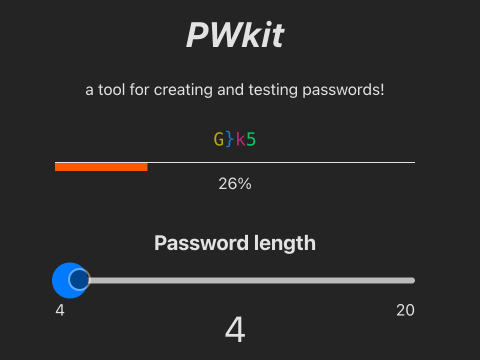PWkit

Modern, customizable password generator and tester with entropy analysis and flexible character group settings.
See a small demo, that uses this package!
Import into your project
pnpm add pwkitnpm install pwkityarn add pwkitUsage
generate a password
import { password } from "pwkit";
// initialize
const pwd = password();
// use with default settings
console.log(pwd.create());more advanced usage
import { password } from "pwkit";
const options = {
length: 12,
lowercase: 4,
symbols: 3,
};
const pwd = password(options);
// generates a random password with a length of 12
// and ensures that at least 4 lower-case letters and
// at least 3 symbols are used for the generation.
console.log(pwd.create());Test a password
import { password } from "pwkit";
const pwd = password();
const myPassword = '.Pa55-W0rD';
const result = pwd.test(myPassword);
console.log(result);Methods
create(options?)
const options = {
// see below
};
const pwd = password(options);
const myPassword = pwd.create();
console.log(myPassword);
// returns, eg.:
// {
// entropy: 65.23561956057013
// length: 10
// password: "7)9uUIU]vg"
// statistic: {
// lowercase: 3,
// uppercase: 3,
// numbers: 2,
// symbols: 2,
// umlauts: 0
// }
// strength: 0.6523561956057012,
// }test(string)
const pwd = password();
const myPassword = '.Pa55-W0rD';
const test = pwd.test(myPassword);
console.log(tmp);
// returns:
// {
// entropy: 65.23561956057013,
// length: 10,
// statistic: {
// lowercase: 2,
// uppercase: 3,
// numbers: 3,
// symbols: 2,
// umlauts: 0,
// },
// strength: 0.6523561956057012,
// }setCharGroups()
to override the character groups
const pwd = password();
const myNewGroups = {
lowercase: 'abcdefg',
uppercase: 'HIJKMLN',
numbers: '0123456',
symbols: '!"§$%&/',
}
pwd.setCharGroups(myNewGroups);resetCharGroups()
reset all Groups to their default value
const pwd = password();
pwd.resetCharGroups();updateSettings()
Useful to override the settings. The old settings will be overwritten!
const pwd = password();
const myNewSettings = {
length: 32,
// and others, see options
};
pwd.updateSettings(myNewSettings);getCharset()
returns all characters (that are used for password generation) as a string.
const pwd = password();
const chars = pwd.getCharset();
console.log(chars);options
options = {
// the length of the password
// default: 10
length: 10,
// should lowercase chars be included
// values: true | false | number
// e.g.: 3 (use at least 3 chars from the lowercase character-set)
// default: true
lowercase: true,
// should uppercase chars be included
// values: true | false | number
// e.g.: 3 (use at least 3 chars from the uppercase character-set)
// default: true
uppercase: true,
// should numbers chars be included
// values: true | false | number
// e.g.: 3 (use at least 3 chars from the numbers character-set)
// default: true
numbers: true,
// should symbols chars be included
// values: true | false | number
// e.g.: 3 (use at least 3 chars from the symbols character-set)
// default: true
symbols: true,
// should umlauts chars be included
// values: true | false | number
// e.g.: 3 (use at least 3 chars from the umlauts character-set)
// default: false
umlauts: false,
// exclude similar looking characters like '0' and 'O'
// values: true | false
// default: false
excludeSimilar: false,
// try to distribute normal over the the selected character-sets!
// e.g.: if set to true, length set to 16, and lowercase, uppercase, numbers, and symbols are set to true. We get 4 lowercase, 4 uppercase, 4 numbers and 4 symbols in the resulting password
// values: true | false
// default: false
normalDistribute: false,
}